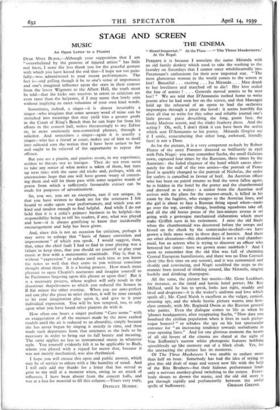STAGE AND SCREEN
MUSIC An Open Letter to a Pianist
DEAR MISS BLANK,—Although your supposition that I am " overwhelmed by the protests of injured artists " has little real basis, I none the less thank you for the graceful gesture with which you have kissed the rod that--I hope not too pain- fully—was administered to your recent performances. The fact is—and galling though it be to one's sense of importance and one's imagined influence upon the stars in their courses from the lesser Wigmore to the Albert Hall, the truth must be told—that the kicks one receives in retort to criticism are even rarer than the ha'pence, if I may name that lowly coin without implying an exact valuation of your own kind words.
Sometimes, indeed, a singer—it is almost invariably a singer—who imagines that some unwary word of mine can be stretched into meanings that may yield him a greater profit in the Court of King's Bench than he can hope for from his efforts in the concert hall, writes threateningly to my Editor or, in more ominously non-committal phrases, through a solicitor. And sometimes a singer—again it is usually a singer—who has a friend at court, makes use of him to instil into editorial ears the notion that I have been unjust to her and ought to be relieved of the opportunity to repeat the offence.
But you are a pianist, and pianists resort, in my experience, neither to threats nor to intrigue. They do not even seem to take any notice of what notice is taken of them, but turn up next time with the same old tricks and, perhaps, with an unconscious hope that one will have grown weary of correct- ing them and will let them pass with some negative words of praise from which a sufficiently favourable extract can be made for purposes of advertisement.
So, you see, you are an exception, rare if not unique, in that you have written to thank me for the strictures I felt bound to make upon your performances, and which you are kind and modest enough to find helpful. And while I do not hold that it is a critic's primary business to be helpful—his responsibility being to tell his readers, if any, what was played and how—it is always gratifying to know that incidentally encouragement and help has been given.
And, since this is not an occasion for criticism, perhaps it may serve to enlarge that " basis of future correction and improvement " of which you speak. I would suggest, then, that, since the chief fault I had to find in your playing was a failure to keep time, that you should set yourself to play your music at first with a metronomic exactitude. Play it, that is, without " expression " or rubato until such time as you know the notes so well that they come to you without conscious thought about them. It is a boring process. How much more pleasant to open Chopin's nocturnes and imagine yourself to be Pachmann lingering upon this phrase or upon that! But it is a necessary process, whose neglect will only result in the disastrous shapelessness to which you reduced the Sonata in B flat minor the other evening. When you are note-perfect and can play the piece in strict rhythm, it will be time enough to let your imagination play upon it, and give to it your individual expression. You will be less tempted, too, to rely upon what you have heard other pianists do with it.
How often one hears a singer perform " Caro nome " with an exaggeration of all the nuances made by the most exalted models until the air is reduced to an absurdity, simply because she has never begun by singing it strictly in time, and then made such departures from that strictness as she feels to be necessary in order to bring out its full beauty and meaning. The same applies no less to instrumental music in whatever style. You yourself evidently felt it to be applicable to Bach, whom you played with a regard for metre that, because it was not merely mechanical, was also rhythmical.
I hope you will excuse this open and public answer, which may be of service to others with a like humility of mind. And I will only add my thanks for a letter that has served as grist to my mill at a moment when, owing to an attack of influenza, I have been absent from the concert halls, and was at a loss for material to fill this column.—Yours very truly,
DYNELEY HUSSEY.






































 Previous page
Previous page